I know thousands of souls in the world , throughout the whole world, I would say, who compel themselves in the prayer with wondrous results. The prayer fortifies them in their spiritual struggle; it enlightens them inwardly, and they confess thoroughly and sincerely. Distressed by the thoughts and temptations which the demons rouse against those who say the prayer, they run with longing to the immaculate Mysteries. Then, they run back to the struggle with thoughts and passions, and then, back again to the Mysteries—they can no longer do without the prayer.
Elder Ephraim of Arizona

Ο Θεός είναι αγάπη και όλος ευσπλαγχνία. Ας μη Τον λυπώμεν εις τίποτε! Σταυρόν δι’ ημάς υπέμεινε, η κεφαλή Του τρυπημένη από τον ακάνθινον στέφανον, η πλευρά από την λόγχην, οι πόδες από τους ήλους, τα νώτα από τας μαστιγώσεις, το πανάγιον στόμα Του από την χολήν και το όξος, η καρδία Του από τον πόνον των ύβρεων και την αχαριστίαν. Γυμνός επάνω εις τον Σταυρόν, εμπρός εις τόσον δαιμονισμένον όχλον. Αυτόν, παιδιά μου, τον Ιησούν μας ας μην Τον λυπώμεν με τας απροσεξίας μας, πονά χειρότερα, εκείνοι, οι Εβραίοι, ήσαν οι εχθροί Του, ενώ ημείς είμεθα οι βαπτισμένοι εις το άγιον Όνομά Του, οι μαθηταί Του, οι αφιερωμένοι εις την υπηρεσίαν Του! Οι μαθηταί Του τον εγκατέλειψαν από τον φόβον των Εβραίων, και πόσον επικράθη δεν λέγεται! Και τώρα όσοι Τον αρνούνται, όσοι Τον εγκαταλείπουν, όσοι άλλα Του υπόσχονται και άλλα πράττουν, πως θα ευρεθούν κοντά Του κατά την ώραν της κρίσεως; Τι θα είπουν, όταν αρχίση ο Χριστός μας να απαριθμή ένα ένα τα παθήματά Του και αυτοί θα έχουν να παρουσιάσουν άρνησιν και πλήθος κακών; Ας προσέχωμεν την ζωήν μας, παιδιά μου. Να έχωμεν αγάπην και υπομονήν εις όλα, να μη κατακρίνωμεν, να διώκωμεν τους κακούς λογισμούς, να ταπεινούμεθα, να ενθυμούμεθα την δύσκολον ώραν του θανάτου και της κρίσεως. Όταν όλα αυτά τα πράττετε, να ηξεύρετε πως με το Χριστό μας θα ζήσετε αιώνια! Ωσάν άγγελοι κοντά εις τον θρόνον Του, θα ψάλλετε άσματα αιώνια και πανευφρόσυνα! Τι ευτυχία τότε! Πως όλα τα εδώ θα ξεχασθούν! Μόνον χαρά και πάσχα χωρίς τέλος! Δόξα τω Θεώ, τω διδόντι ημίν την νίκην.
Γέροντας Εφραίμ Φιλοθεΐτης
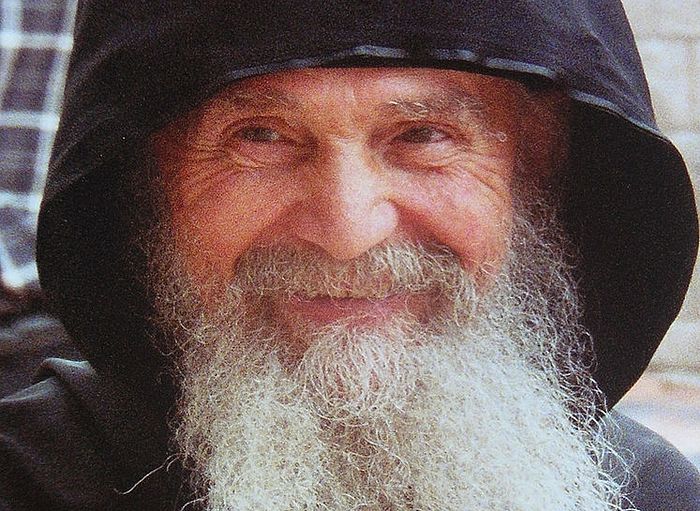 Elder Ephraim is a spiritual child of the great Elder Joseph the Hesychast, and wrote about his spiritual father in the amazing book My Elder Joseph the Hesychast. Elder Ephraim became known as “of Philotheou” from 1973 when he was elected abbot of the monastery of Philotheou on Mt. Athos and in no time revived the ascetic monastic life there. After that the Sacred Community of the Holy Mountain blessed Elder Ephraim to expand and fill three other Athonite monasteries with those seeking the monastic life: Xeropotamou, Konstamonitou, and Karakallou. These monasteries remain under the spiritual guidance of Archimandrite Ephraim, as are a number of men’s and women’s monasteries in Greece and North America.
Elder Ephraim is a spiritual child of the great Elder Joseph the Hesychast, and wrote about his spiritual father in the amazing book My Elder Joseph the Hesychast. Elder Ephraim became known as “of Philotheou” from 1973 when he was elected abbot of the monastery of Philotheou on Mt. Athos and in no time revived the ascetic monastic life there. After that the Sacred Community of the Holy Mountain blessed Elder Ephraim to expand and fill three other Athonite monasteries with those seeking the monastic life: Xeropotamou, Konstamonitou, and Karakallou. These monasteries remain under the spiritual guidance of Archimandrite Ephraim, as are a number of men’s and women’s monasteries in Greece and North America.
In 1960 the Greek Orthodox priest and theologian Archpriest John Romanides wrote: “Athonites should immediately send their representatives to the US and found there monastic habitations, otherwise Orthodoxy on the American continent awaits its inevitable doom.” A few years later these prophetic words were realized in the life and efforts of just one man. The monasteries of Elder Ephraim have appeared in many regions of the US and Canada: New York, Texas, Florida, Washington, North Carolina, Pennsylvania, Illinois, California, Michigan, Montreal and Toronto. Chief among these is the Holy Monastery of St. Anthony the Great in Arizona. And now the elder is also often recognized as “of Arizona.”
We present our readers with a conversation with his spiritual child, a very interesting person, Alexandra Lagos. She was also nourished by Gerontissa Macrina, abbess of the Monastery of the Panagia Hodigitria near the Greek city of Volos, founded with the blessing of the great elder Joseph the Hesychast. According to the testimony of the sisters, Gerontissa Macrina greatly loved Alexandra and often remembered her name in conversations with people. Alexandra is acquainted with many ascetics of piety of modern Greece, even having conversed with Venerable Paisios the Athonite. St. Paisios said to her about her spiritual father Elder Ephraim: “You have such a great elder!”
Alexandra is a professor of history and archaeology, working many years in the history faculty at the Medical University of Ioannina (Northern Greece). With the blessing of her spiritual father she always tries to base her work on the Patristic tradition and to teach on the foundation of the Orthodox worldview. Monastics, spiritual fathers, superiors of the monasteries of Elder Ephraim and his lay spiritual children often stay in the house of Alexandra and her husband George Lagos, who is a professor of neurology in the same medical university.
Alexandra has been fortunate not only to become closely acquainted with and a friend to many spiritual children of Elder Ephraim, but also to have visited his monasteries many times for extended stays both in Greece and in America. Her family has always rendered (and does so until now) help to the elder and support in his labors. Thus it is possible to say that the building of the elder’s monasteries occurred in front of her eyes. Alexandra currently lives in Arizona not far from the monastery of St. Anthony the Great, and with the blessing of the elder leads catechism classes and Sunday talks for pilgrims to the monastery, and also offers lessons in Ancient and Modern Greek for all who are interested.
* * *
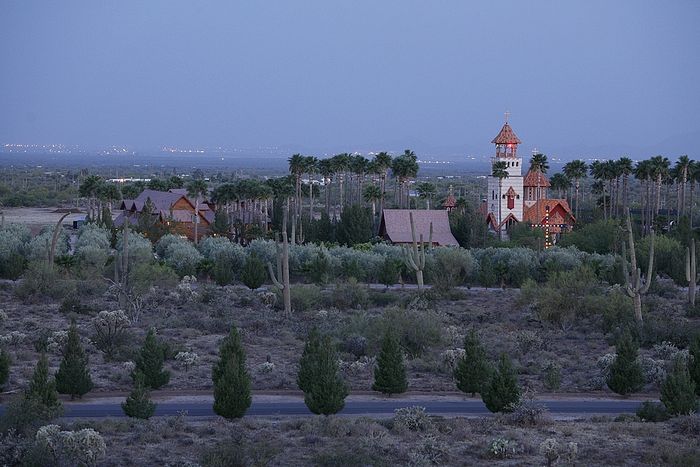 St. Anthony's Monastery
St. Anthony's Monastery
—Alexandra, could you tell us about how you came to be under the guidance of Elder Ephraim?
—My husband and I have been spiritual children of Elder Ephraim for thirty years already. We learned about the elder in 1986 and by the grace of God he became the spiritual father for our whole family. On the first day of our acquaintance the elder shared with us with great enthusiasm his plans regarding “his great work,” that is, the building of monasteries.
We all know that Elder Ephraim has built eighteen monasteries in North America. Paralleled with the founding of these new monasteries in North America he revived ancient Greek monasteries, destroyed and abandoned since the time of the Turkish yoke. In Greece, as in Russia, many beautiful monasteries found themselves, and still find themselves in desolation, due to a lack of means for their restoration and of potential inhabitants. So the first half of the elder’s “great work” occurred in North America, and the second half in Greece.
—Alexandra, has your spiritual father spoken to you about his elder—Joseph the Hesychast? Was it revealed to the great Elder Joseph that his spiritual son would build monasteries?
—The spiritual children of Elder Ephraim often call Elder Joseph “Grandpa” since he’s the spiritual father of their spiritual father. When Grandpa Joseph was still alive he told Elder Ephraim that he had received word from the Lord that a great work awaits Elder Ephraim in the future. Grandpa Joseph made sure that his spiritual son ate well, and would say to him: “Eat, eat, my little one, you have before you a great podvig; you will do much work.”
In his book Elder Ephraim mentions that once Elder Joseph said to him: “The hour is coming when you will speak in the midst of the church.” Elder Ephraim then thought: “Our little skete church has trouble holding three people. Just think, what a great thing if I ever have to speak in the middle of it!”
Elder Ephraim received a very strict spiritual education from his elder. Elder Joseph didn’t relate to any of his other novices so strictly as he did to Elder Ephraim—precisely because he knew what labor awaited him in the future.
Before Elder Joseph departed to the Lord he divided his disciples—who should stay with whom after his death. In obedience to Fr. Ephraim he placed Fr. Joseph who then for many years served in Portaria. Elder Joseph also entrusted Fr. Ephraim to take under his spiritual direction the women’s community in Volos. Elder Ephraim’s mother lived in this sisterhood, and the gerontissa Macrina (Maria at that time). This community later gave rise to the famous convent in Portaria.
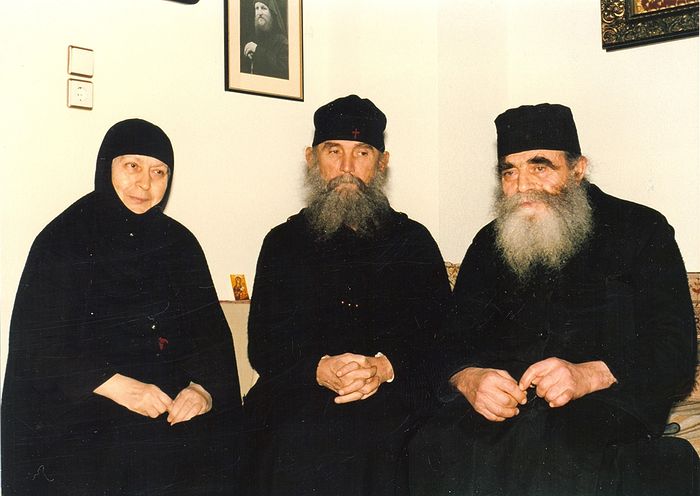 Gerontissa Macrina, Elder Ephraim, Fr. Joseph
Gerontissa Macrina, Elder Ephraim, Fr. Joseph
—Alexandra, could you tell us how, thanks to Elder Ephraim, this monastery became the “mother convent” for many other women’s monasteries?
—Among the spiritual children of Elder Ephraim the unofficial name of “metropolia” for the monastery in Portaria was entrenched. The word “metropolia” (Gk. Μητρόπολις) is translated as “mother city,” from μητέρα—“mother” and πολις—“city.” In Greek cities it’s the most ancient part of the city from which comes, or figuratively speaking, “is born” the rest of the city. In the case of the Portaria monastery it’s considered that it became like a “mother monastery” for the elder’s other female monasteries. This is how it happened.
Under the direction of such great ascetics as Elder Ephraim and Gerontissa Macrina, the sisters of the monastery in Portaria began to spiritually prosper very quickly and were filled with every virtue. When the elder began to open one monastery after another, first in Greece and then in America, he needed spiritually experienced nuns, being well-acquainted with those traditions which he and Gerontissa Macrina imbibed from Grandpa Joseph. It was precisely such nuns that Elder Ephraim aimed to make the first inhabitants of his monasteries, so that they might then hand on as an inheritance the spiritual traditions of Elder Joseph the Hesychast to the next generation of monks and nuns.
—Which monasteries were opened?
—At first Elder Ephraim managed to persuade Igumena Macrina to release a few sisters to the first two monasteries he opened in Greece—of the Prophet and Forerunner John in Serres Township and of the Archangel Michael on the island of Thassos.
In the early 1980’s Elder Ephraim relocated his mother, Nun Theophano (†1986), and other sisters to the newly-opened Philotheou metochion on the island of Thassos. Gerontissa Ephraimia, who until the present day is the superior of the Thassos monastery, was at that time a young girl from the city of Volos. She often visited the monastery in Portaria and knew Elder Ephraim, Gerontissa Macrina, Gerontissa Theophano—you could say she grew up in their hands.
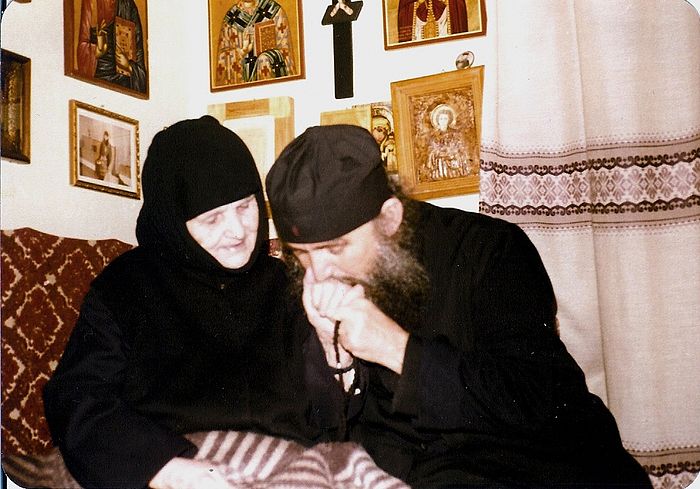 Elder Ephraim with his mother, Nun Theophano
Elder Ephraim with his mother, Nun Theophano
Then Elder Ephraim took from Portaria four sisters: Fevronia, Markella, Thekla, and Vriani, and opened a monastery in Serres, establishing Nun Fevronia as the igumena. After that, Gerontissa Macrina said she wouldn’t give up any more sisters from her monastery. When Elder Ephraim entreated her about it, the gerontissa replied: “As long as I live, I cannot give any more.” She was a very sensitive person and loved her sisters, and seeing the difficulties which they endured after leaving the monastery, like a good mother, she had much pity and worry for them.
—In these same years Elder Ephraim begins to build monasteries in America…
—Yes, in those same years Elder Ephraim began to regularly visit North America—Canada and America. At first he traveled there one-two months a year. The elder saw that many Greek immigrant families were in need of spiritual support—confession, the services, the word of God. Once one man, a spiritual child of the elder, invited him to Hawaii in order to confess the local Orthodox. There Elder Ephraim had a vision. He saw Grandpa Joseph, who poured out onto his lap an abundance of oranges with the words: “You will plant oranges, dear one! You will see how much fruit there will be!” from which he understood that he needed to labor in America.
During those ten years that Elder Ephraim would visit America, he realized that one-two months a year would not suffice. It was necessary to begin constructing monasteries in America. He also received a revelation from the Lord that it was necessary to build monasteries. This is how the elder told us about it in conversation. At first he didn’t want to accept this “great work” of building monasteries. He prayed to the Lord, telling Him that he was not able to accept this work. In one moment he heard the voice of Christ, Who said to him: “No, you will render to Me obedience and take this work to yourself.” Then the elder answered: “Alright, Lord, but only grant me so much love as to be enough for all the people who will come to me.”
Where did twenty (monasteries in North America) come from? In his work Gifts of the Desert (2005) Kyriakos Markides notes that the elder’s task was to build in America as many monasteries as there are on Holy Mount Athos. Why did he have to build monasteries precisely in America? The elder said in conversatoin that the work of building monasteries is for the last times when the “enemy” (antichrist) will come, and in America because it’s from there that it all will begin, and people here are in need of spiritual nourishment and help.
—Which convents in America were opened by Elder Ephraim? Which of his nuns became the gerontissas in these monasteries?
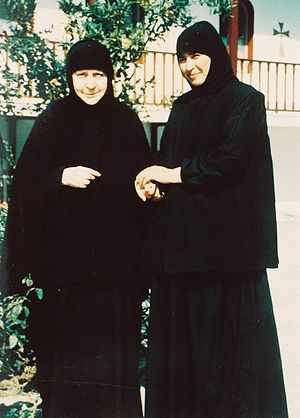 Gerontissa Macrina, Gerontissa Taxiarchia —The elder’s first monastery in America, opening in 1989, was the monastery of the Nativity of the Theotokos in Pennsylvania. The first gerontissa of the elder in America was Gerontissa Taxiarchia († 1994) of blessed memory.
Gerontissa Macrina, Gerontissa Taxiarchia —The elder’s first monastery in America, opening in 1989, was the monastery of the Nativity of the Theotokos in Pennsylvania. The first gerontissa of the elder in America was Gerontissa Taxiarchia († 1994) of blessed memory.
Gerontissa Taxiarchia was a holy soul, chosen of God. She had such great spiritual gifts like Gerontissa Macrina had. After her repose Elder Macrina spoke thus about her: “She never once upset me, never once opposed me. She was an angel.” Gerontissa Macrina was much attached to her and very worried about her. Gerontissa Taxiarchia was an exceedingly beautiful, kind, gentle and smiling woman. She didn’t have any of that sternness in her which we often see in monastics.
After Gerontissa Taxiarchia left for America in 1989 she wrote letters to Gerontissa Macrina in which you could feel her pain: it was evident how difficult it was for her to live so far from her home monastery, in a foreign land, without language, not having a single acquaintance, not even anyone to pray with—for the first time she was completely alone in a monastery. Gerontissa Macrina flew to America once to visit her beloved, and to see with her own eyes all these difficulties. It confirmed for her the decision not to release any other sisters from the monastery.
Therefore, although Elder Ephraim would have preferred to take all the sisters from Portaria for America, but whereas Gerontissa Macrina said “As long as I live, I cannot give any more,” he began to take sisters for America from the monasteries on Thassos and Serres.
There was a turning point, some instruction from above on the day of Gerontissa Taxiarchia’s burial. She lived less than five years in America and departed to the Lord on August 3, 1994, having died from cancer. Practically the whole spiritual family of Elder Ephraim gathered at her funeral in Pennsylvania: Gerontissa Macrina and several other sisters from Greece flew in, the American gerontissas gathered, and from the Holy Mountain came Elder Ephraim himself.
Not long before the burial a miracle occurred: on the forehead of the reposed Gerontissa Taxiarchia there appeared myrrh in the form of drops, looking like droplets of sweat, but emitting a wondrous fragrance. All present saw this miracle. It made such a strong impression on Gerontissa Macrina that she agreed to give up her sisters to America.
In October 1994 Elder Ephraim agreed with Gerontissa Macrina about which sisters he could take and in May 1995 a few nuns moved from Portaria to America. Gerontissa Macrina wept, sending her spiritual children to America. In doing so she said: “What other mother has worried so much as I have? So many children to raise, educate—so you can take them right out of my hands!” Not that she didn’t want to give them to God—her whole life was given to God, but she, as a mother, was very sensitive and strongly attached to her sisters, wanting to protect them from dangers, seeing their difficulties after they left her monastery. It was her cross.
Gerontissa Eupraxia came to the monastery at the age of eighteen and left Portaria for America around fifty years of age. Thus, she spent many years together with Gerontissa Macrina. She came to America for the burial of Gerontissa Taxiarchia and afterwards the elder invited her for a walk and announced to her that he wanted her to move to America and become the abbess of a new monastery. This occurred in August 1994.
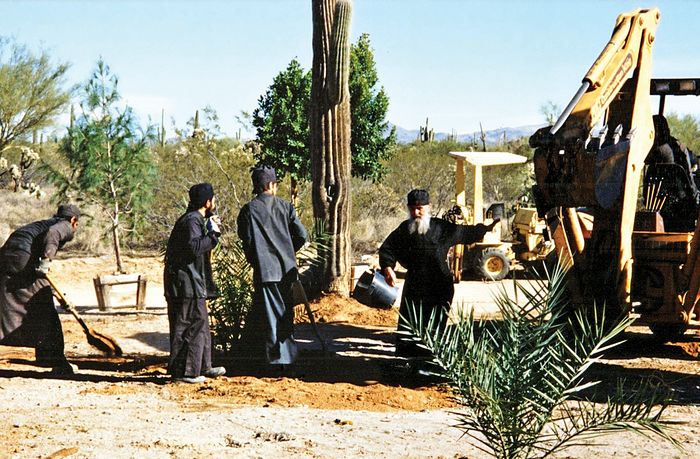 Planting trees, Elder Ephraim working along with the brethren
Planting trees, Elder Ephraim working along with the brethren
—What difficulties did Elder Ephraim encounter in building his monasteries in America?
—Building monasteries in America was not easy. There, even amongst the Orthodox, there can be felt a totally different religious tradition—the tradition of secularism. But Elder Ephraim managed to achieve amazing results, making wise decisions—in part thanks to Divine illumination, in part with the help of his amazing character—he is a very smart and clever person and does any work quickly and beautifully.
The elder saw that it was necessary to do everything quickly. He would constantly say: “We must hasten to make it in time—hard times are soon coming in the world.” Nevertheless, he met great resistance on the part of Archbishop Iakovos (Koukouzis), who at first did not give a blessing for the building of the monasteries. Gerontissa Taxiarchia had a hard time because she was completely alone, but she was a holy soul and had a multitude of gifts.
The elder soon realized that he would not receive a blessing from the Greek Church to build more monasteries in America. At this time he became acquainted with some hierarchs of the Russian Church Abroad and they offered him their help. When the elder spoke about this offer in Greece it caused a wave of condemnation from many of his acquaintances and official Church personalities and he came into a very difficult situation. They told him that the Russian Orthodox Church Outside of Russia (ROCOR) was a non-canonical Church. Many then called the elder deceived.
When this all was happening the elder reached the state of abandonment by God: My God, my God, why hast Thou forsaken me!” At the same time, his spiritual children testify that in this difficult period Elder Ephraim had so much grace that he exuded a sweet fragrance. Everything the elder touched began to sweetly smell. When he confessed children, covering their heads with his epitrachelion, their hair had this fragrance for a few days. If he touched napkins they began to emit this fragrance. His clothes and skufias emitted the fragrance. The stronger were the temptations, the stronger this fragrance was felt. Not just Elder Ephraim himself, but his spiritual children received revelations from the Lord that what the elder was doing was from God.
In the end, after a few months the elder received a blessing from the Ecumenical Patriarch to build monasteries. Archbishop Iakovos, who had been an opponent of the construction, had by that time departed to the Lord. His successor was the monastic-loving Archbishop Spyridon (Papageorgiou, 1996-1999). Then Elder Ephraim began to open monasteries one after the other.
The elder managed just in time. Archbishop Spyridon resigned from his post in 1999 and a difficult period again began for the elder. This is what he had to say about it: “The more struggles I have, the more I love this work,” and, “Great work comes in great steps. We must hurry to accomplish everything,” and, “Who can withstand the will of God?!” The spiritual children of the elder say that he always spoke to them about his “great work” with great enthusiasm and love. His work came through much suffering, accompanied by many difficulties and, and his face was washed with streams of prayerful tears. In Greece there is no other such example, no other such person, who could have done such a work with his life.
—Alexandra, how many monasteries are now under the spiritual direction of Elder Ephraim?
—There are currently eighteen monasteries in America, and the elder is the spiritual father of four monasteries on Mt. Athos and of eight women’s monasteries in Greece. Besides these there are a few brotherhoods and sisterhoods not having the status of monasteries (so-called “sketes” of the elder).
Thus, the work of Elder Ephraim is unique. The Lord prepared him and gave much grace and great boldness to complete this “great work.” Well, and, of course, prayer. The elder mentioned in his talks that he never makes a serious decision without having received word from God on how to proceed. How he receives these notifications from God is a mystery for us. We can’t understand. But all of his decisions about which monks or nuns to appoint igumen or igumena he made only after ardent prayer and some word from God. Such a great work could never have been accomplished by the strength of one man. How can one person manage to do so much in his life? How many brotherhoods and sisterhoods were created in America, Greece, on the Holy Mountain, how many laymen and Orthodox families the elder nourishes!
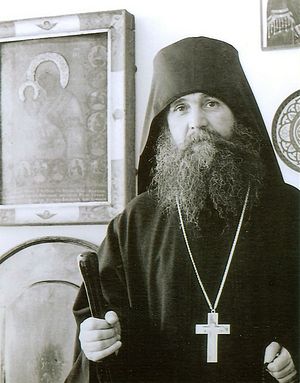 Elder Ephraim, when he was abbot of Philotheou Monastery Yes, Elder Ephraim received a worthy education from Grandpa Joseph. Grandpa Joseph had schooled him in unconditional obedience because he knew that after his death Elder Ephraim would have to render obedience to Christ Himself, and it is exceedingly more difficult. Just imagine, was it easy for Elder Ephraim to leave the Athonite Philotheou Monastery, so wonderful, blessed, beautifully-organized, and pass it into the hands of his pupil in order to roam somewhere far from his Motherland?!
Elder Ephraim, when he was abbot of Philotheou Monastery Yes, Elder Ephraim received a worthy education from Grandpa Joseph. Grandpa Joseph had schooled him in unconditional obedience because he knew that after his death Elder Ephraim would have to render obedience to Christ Himself, and it is exceedingly more difficult. Just imagine, was it easy for Elder Ephraim to leave the Athonite Philotheou Monastery, so wonderful, blessed, beautifully-organized, and pass it into the hands of his pupil in order to roam somewhere far from his Motherland?!
Then he began to erect monasteries, deciding where and how to build. He had to not only decide which sisters to take from Greece or America for each one of them, but to attract the help of local Orthodox families for purchasing a piece of land for building. Many families took money from their accounts to pay for the purchase of land for building the monasteries.
Every monastery has its story about how the elder decided which plot of land to buy and what and how to build. Awaiting the arrival of the first monks and nuns in every new monastery, the elder took care to prepare well their new homes, and make them cozy and attractive. He would personally deliver bouquets of fresh flowers, place in the gardens cute little sculptures of animals, and fille the refrigerators with fresh products on the eve of their arrival.
The elder took great care to ensure that the fathers or sisters had every necessity to immediately begin normal monastic life in their new place. However, there eventually came the moment when he had to leave and the immigrants were left alone to continue on their own what the elder had begun. And he would leave, carrying on his shoulders the burden of caring for another new monastery.
Elder Ephraim also says that he is always helped by the prayerful intercessions of his elder, Grandpa Joseph. “I have never done anything without the blessing of my elder. I leave and enter my cell and every time I mentally take a blessing from my elder,” Elder Ephraim tells his spiritual children. And Grandpa Joseph is a great man of prayer and aid not just for Elder Ephraim in his labors, but for all.
—We thank you, Alexandra, for this wonderful conversation!
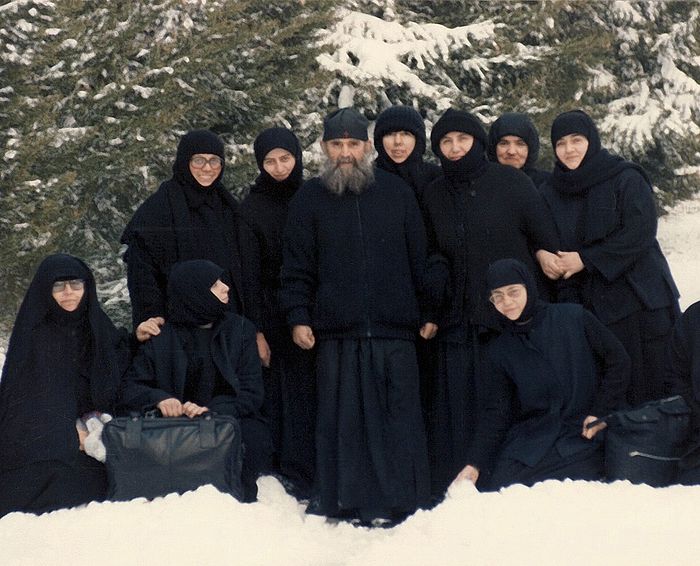 Elder Ephraim with sisters in North America
Elder Ephraim with sisters in North America
* * *
Hierodeacon of the Monastery of St. Anthony the Great in Arizona, Fr. Seraphim (Molibog) has offered a small addition to our conversation, expanding on some points from our conversation with Alexandra Lagos:
—The first monastery opened by the elder in America was the women’s Monastery of the Nativity of the Theotokos near Pittsburgh in Pennsylvania, in 1989. Unfortunately, because of the secularization of the Greek Church in North America the elder was resisted and they didn’t allow him to open other monasteries. They even tried to expel him from the country. Then he, I am sure by Divine revelation, switched to the jurisdiction of ROCOR (the monastery of the Nativity of the Theotokos remained in the Greek Archdiocese). The ROCOR synod accepted Elder Ephraim with great love and said to him: “Elder, open monasteries and bring monks and nuns from Greece to inhabit them.”
With great love Elder Ephraim recalled that time and said that he met holy people in the Russian Church, both bishops and priests. His meeting with Archbishop Constantine (Yesensky), vicar of the Eastern American Diocese who reposed on May 31, 1996 and whose remains were discovered to be incorrupt when they were transferred in December 2014 from Texas to the Holy Trinity Monastery in Jordanville, NY, made a particular impression on him.
Upon meeting they fell at one another’s feet, asking one another’s blessing. Vladyka Constantine’s appearance made an indelible impression on the elder: he wore a threadbare skufia, “like a monk from Karoulia on Athos.” The elder also very much liked the pious Russian Orthodox immigrants.
When news of the elder’s transfer to ROCOR reached Athos and the Ecumenical Patriarch there arose, unfortunately, a storm of misunderstanding and indignation from some people. The Ecumenical Patriarch demanded an explanation from the elder. The Greek Archdiocese asked the elder to return and promised to let him open monasteries. The elder realized that the best solution to this very difficult situation would be to return to the Greeks, which he did in the course of about a year after leaving. He later said: “If not for the protests I would have stayed in the Russian Church Abroad.”
By the time of the opening of the monastery of St. Anthony the Great in Arizona in the summer of 1995 the elder managed to open six more monasteries. In 1996 His Eminence Spyridon became the archbishop of the Greek Church in America. He very much supported the elder, and during his service (July 30, 1996-August 19, 1999) the elder opened eight more monasteries. Elder Ephraim opened the last two monasteries after Archbishop Spyridon’s retirement.
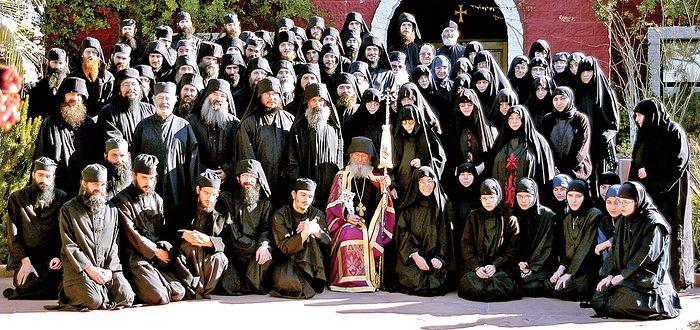 Elder Ephraim with spiritual children
Elder Ephraim with spiritual children
* * *
Monasteries founded by Elder Ephraim in North America:
1. Holy Monastery of the Nativity of the Theotokos, Saxonburg, PA
2. Holy Monastery of St. Kosmas Aitolos, Bolton, Ontario, Canada
3. Holy Monastery of Panagia Parigoritissa, Brownsburg, Quebec, Canada
4. Holy Monastery of St. John Chrysostom, Pleasant Prairie, Wisconsin
5. Holy Protection Monastery, White Haven, PA
6. Holy Monastery of the Theotokos, the Life-Giving Spring, Dunlap, CA
7. Holy Monastery of St. John the Forerunner, Goldendale, WA
8. Holy Monastery of St. Anthony, Florence, AZ
9. Holy Archangels’ Monastery, Kendalia, TX
10. Holy Monastery of Panagia Vlahernon, Williston, FL
11. Annunciation Monastery, Reddick, FL
12. Holy Trinity Monastery, Smith Creek, MI
13. Holy Monastery of Panagia Prousiotissa, Troy, NC
14. Panagia Pammakaristou, Lawsonville, NC
15. Holy Monastery of St. Nektarios, Roscoe, NY
16. Holy Transfiguration Monastery, Harvard, IL
17. Holy Monastery of St. Paraskevi, Washington, TX
18. Holy Monastery of the Dormition of the Theotokos, Conchise Stronghold, AZ
http://www.pravoslavie.ru/english/96543.htm
Ο άγιος Συμεών ο νέος Θεολόγος δέχθηκε την άνωθεν ευλογία για την υπακοή και μόνον. Είναι ένα παράδειγμα τόσον πολύ δυνατό και φανερό.
Εκείνος ο υποτακτικός, που είχε Γέροντα τον άγιο Παϊσιο, όταν του είπε μια μέρα: «Παιδί μου, πήγαινε να πιης νερό από εκείνη τη λεκάνη κ.λ.π.», είπε με το λογισμό του: «Αντί να μου ειπή ο Γέροντας, πήγαινε να πιης από το σταμνί, από τη βρύση, μια και ήρθα από το διακόνημα κουρασμένος, ιδρωμένος, μου λέγει να πιω από αυτό το απόπλυμα, που είναι μέσα στη λεκάνη!»
Έβαλε το δικό του λογισμό και απέτυχε της μεγάλης επιτυχίας! Μετά εσκέφθη: «Δεν πάω να πιω;» αλλά δεν βρήκε καθόλου νερό. Του λέγει τότε ο αββάς Παϊσιος: «Ταλαίπωρε, ξέρεις εκείνο το απόπλυμα τι ήταν; Ήταν το απόπλυμα από τα πόδια του Χριστού!». Από τότε του ήρθε πνεύμα λύπης και προσπαθούσε να τον παρηγορήση ο αββάς Παϊσιος, αλλά που παρηγοριά. Έφθασε σε σημείο, να μην έχη καθόλου ειρήνη. Τότε του λέγει μια φορά ο άγιος, μια και δεν ημπορούσε να ειρηνεύση και να παραμείνη κοντά του: «Πήγαινε στο τάδε μέρος.
Υπάρχουν εκεί τρεις τάφοι, και σ’ ένα από αυτούς ( του υπέδειξε κάποιον ), κάνε μια προσευχή και άκουσε τι θα σου ειπή…». Έτσι και έγινε, ακούει φωνή να του λέγη: «Να πας πίσω στο Γέροντάς σου και να κάνης υπακοή». Αλλά αυτός πλέον είχε ναυαγήσει εσωτερικά, είχε πάθει τέτοιες ρωγμές το σπίτι της ψυχής του, που δεν μπορούσε πλέον να τις ξανακλείση. Γι’ αυτό και μέχρι το τέλος της ζωής του πέρασε ταλαντευόμενος και κλυδωνιζόμενος στην υπακοή κοντά στον αββά Παϊσιο.
Ο μεν Συμεών ο νέος Θεολόγος θριαμβεύσας κατά του ιδίου θελήματος, πήρε την άνωθεν θεολογία για τη τελεία του υπακοή. Και ο άλλος κάνοντας το ίδιο θέλημα, έμεινε εκτός υπακοής και χάριτος.
Αυτά είναι ελάχιστα παραδείγματα βέβαια, διότι εάν γράφονταν όσα οι πατέρες εκείνοι, οι άριστοι υποτακτικοί, έκαναν, θα ημπορούσαν ολόκληροι τόμοι από βιβλία να γράφουν. Σαν καθρέφτες είναι αυτά τα παραδείγματα, που ημπορούμε να δούμε τον εαυτό μας μέσα και να δούμε εμείς τι μορφή έχομεν…
Ο Θεός να μας βοηθήση να συνέλθη έκαστος, να δούμε τον εαυτό μας, κατά πόσον έχουμε απαρνηθή το ίδιο θέλημα. Ας αγωνισθούμε να απογυμνωθούμε από αυτό το δηλητήριο, δια να μπορέσουμε να ζήσουμε κατά Θεόν και όπως ο Θεός θέλει και όπως το επάγγελμα το μοναχικό απαιτεί από μας.
Γέροντας Εφραίμ Φιλοθεΐτης )

Δύο χάριτας αποκτά κανείς, όταν αγωνίζεται κατά Θεόν. Μία είναι η παράκλησις του Αγίου Πνεύματος, που γεμίζει την ψυχήν χαράς, ειρήνης, αγαλλιάσεως κ.λ.π. η δε άλλη χάρις είναι η λεγομένη πείρα των πειρασμών. Αυτή η χάρις της πείρας είναι ανεξίτηλος από την ψυχήν, δηλαδή δεν φεύγει από τον άνθρωπον, διότι είναι ηνωμένη με την καρδίαν, που εδέχθη την πείραν των πειρασμών, ενώ η πρώτη, της χάριτος του Αγίου Πνεύματος, πότε έρχεται και πότε φεύγει. Εν καιρώ πειρασμών η δευτέρα χάρις, η πείρα, είναι πιο ωφέλιμος, διότι φωτίζει την ψυχήν, πώς να διέλθη τους πειρασμούς, διότι η πείρα προήλθεν από τους πειρασμούς, οπότε γνωρίζει πως και πάλιν να απαλλάξη την ψυχήν από τον κίνδυνον. Άρα οι πειρασμοί, όταν τους υπομένωμεν, μας χαρίζουν την σοφίαν των πειρασμών και ούτω γινόμεθα φιλόσοφοι. Αν δεν ταπεινωθώμεν, δεν πρόκειται να σταματήση η μάθησις των πειρασμών. Ο εγωϊσμός δημιουργεί τους πειρασμούς και οι πειρασμοί τον αχρηστεύουν. Λοιπόν ταπεινώσου, παιδί μου, αν θέλης να ταπεινωθούν οι διάβολοι που σε θλίβουν. Ρίξε τον εαυτόν σου υπό κάτω όλων και ειπέ: «Εγώ είμαι ο τελευταίος του κόσμου και εγώ πταίω δι’ όλα».
Γέροντας Εφραίμ Φιλοθεΐτης
To guard love, the pinnacle of virtues, diligence in prayer is an immediate spiritual necessity. Struggle in prayer if you want our Christ to dwell in you, and He, the most experienced general, will struggle together with you. He will fight for us and grant us the victory. We become like roaring lions when we get a good grip on the prayer—not when we pray carelessly or lukewarmly, but with strength of soul! Invigorate yourselves with the thought that the prayer is everything. Without the prayer, expect a general decline, going from one fall to another. If we hold on to the prayer with all our strength during temptations, we will certainly overcome the devil and we shall ascribe the victory to the all-holy name of Christ.
Elder Ephraim of Arizona

Repentance is endless. All the virtues, by the grace of God, may be perfected by man, but no one can perfect repentance, since we need repentance until our last breath, for we err in the twinkling of an eye. Therefore, repentance is interminable. Oh, how good God is! Justly will my fellow sinners be punished, for they have ignored the infinite compassion of the heavenly Father. Although we err as humans, we are sluggish to say, “I have sinned!” But how can we say this, since we (and I, above all ) are forgetful and lazy and proud, too—mighty obstacles on the road to humility! Christ showed this road to us through His Cross, but unfortunately we voluntarily turn a deaf ear to Him, to our great regret. Time flies, the years roll by, and we are drawing nearer and nearer to eternity. We see this, yet a mental numbness has bound us until we (and I, first ) are thrown into hell! My God, Who has delivered the human race from the enemy’s slavery, deliver us also from the future condemnation when You come to judge the world and render to each according to his works (cf. Rev. 22:12 ). Through your prayers, may I find mercy when my wretched soul is judged, for I am afraid to meet the fearsome Judge because my conscience reproaches me.
Elder Ephraim of Arizona

Κύριε Ιησού Χριστέ, ελέησόν με.
Η καρδιά του ανθρώπου είναι το κέντρο των υπέρ φύσιν, των κατά φύσιν και των παρά φύσιν κινήσεων. Τα πάντα ξεκινούν από την καρδιά. Εάν η καρδιά του ανθρώπου καθαρισθή, βλέπομε τον Θεό. Πως όμως θα ιδούμε τον Θεό; Μήπως ο Θεός είναι ανθρωπόμορφος; Έχει σχήμα ανθρώπου; Όχι! Ο Θεός είναι αθεώρητος, ο Θεός είναι Πνεύμα. Δύναται όμως να βασιλεύση και στην καρδιά του ανθρώπου, όταν αυτή γίνη δεκτικό δοχείο. Για να γίνη δεκτικό δοχείο η καρδιά του ανθρώπου, πρέπει να γίνη καθαρή από λογισμούς ακάθαρτους. Για να καθαρισθή όμως η καρδιά, πρέπει να μπη σ’ αυτήν κάποιο φάρμακο. Το φάρμακο αυτό είναι η προσευχή. Όπου πηγαίνει ο βασιλεύς, διώκονται οι εχθροί, και όταν μπη στην καρδιά ο Χριστός, το όνομά Του το Άγιο, φυγαδεύονται των δαιμόνων οι φάλαγγες. Όταν ενθρονισθή μέσα καλά-καλά ο Χριστός, τότε υπακούουν τα πάντα. Όπως όταν ένας βασιλεύς κυριεύση ένα κράτος και πάη και ενθρονισθή στην πρωτεύουσα, τότε θα υποτάξη όλους τους επαναστάτες με τους στρατιώτες του. Δηλαδή θα καταδιώξη τους εχθρούς και θα καθησυχάση το κράτος από τις εσωτερικές ανωμαλίες και τότε θα επέλθη ειρήνη. Ο βασιλεύς κάθεται στο θρόνο του και βλέπει ότι όλα είναι υποτεταγμένα και υποτελή. Τότε χαίρεται και αγάλλεται βλέποντας ότι ο κόπος και η μάχη τελείωσαν και έφεραν την υπακοή και την ειρήνη και όλα τα επιτεύγματα.
Έτσι είναι και το κράτος της καρδιάς μας. Έχει μέσα εχθρούς, έχει επαναστάσεις, έχει λογισμούς, έχει πάθη και αδυναμίες, έχει τρικυμίες και ταραχές. Όλα στην καρδιά του ανθρώπου. Για να μπορέση αυτό το κράτος της καρδιάς να καθησυχάση και να υποταχθή, πρέπει να έρθη ο Χριστός, ο βασιλεύς, με τις στρατιές Του, να το κυριεύση και να διώξη τον εχθρό, τον διάβολο, να καθυποτάξη κάθε ανησυχία από πάθη και αδυναμίες, να βασιλεύση σαν αυτοκράτωρ, σαν παντοδύναμος. Τότε αυτή η κατάσταση κατά τους πατέρες λέγεται καρδιακή ησυχία, δηλαδή να βασιλεύη η προσευχή χωρίς να διακόπτεται, δημιουργώντας την καθαρότητα και την ήσυχη καρδιά. Οι τρόποι της προσευχής είναι πολλοί. Υπάρχει βέβαια ο προφορικός τρόπος, δηλαδή να λέμε την ευχή με το στόμα. Αυτός ο τρόπος είναι εκείνος, που πρέπει να μεταχειρισθούμε κατ’ αρχάς, όταν αρχίζουμε να εργαζόμαστε την ευχή, για να πετύχουμε τον τελικό σκοπό μας. Ο νους του ανθρώπου είναι αεικίνητος, κινείται πάντοτε, και επειδή κινείται όχι κατά φύσι, κατά χρήσι, αλλά κατά κατάχρησι και κατά αδιαφορία, γυρίζει όλο τον κόσμο και επαναπαύεται στις διάφορες ηδονές.
Άλλοτε πάει στα σαρκικά και απολαμβάνει την ηδονή, άλλοτε στα άλλα πάθη και άλλοτε αδιάφορα χαζεύει εδώ και εκεί. Όπου και αν πάη, όπου και αν σταθή, έχει και κάποια ηδονή. Τώρα ο άνθρωπος ο οποίος έχει σκοπό να κερδίση το «αδιαλείπτως προσεύχεσθε» (Α΄ Θεσσαλ. 5,17 ) πρέπει να συμμαζέψη αυτόν τον σκορπισμένο νου τον αλήτη που γυρίζει όλα τα σοκάκια, ώστε να συμμορφωθή και να γίνη νοικοκύρης.
Για να τον μαζέψουμε όμως, πρέπει να του προσφέρουμε κάτι, να τον γλυκάνουμε, διότι, όπως είπαμε, ευχαριστείται και ηδονίζεται να γυρίζη εδώ και εκεί. Πρέπει να τον ελκύσωμε με κάτι το ηδονικό πάλι. Γι’ αυτό χρειάζεται κατ’ αρχάς να λέμε την προσευχή με το στόμα. Ο αρχάριος, που διδάσκεται την προσευχή, πρέπει να αρχίση με το στόμα να λέγη: «Κύριε Ιησού Χριστέ, ελέησόν με» και να προσπαθή να τραβά το νου από τα κοσμικά. Η φωνή η οποία θα βγαίνη, ο ήχος της φωνής, θα ελκύη το νου, να προσέχη την ευχή, οπότε σιγά-σιγά θα συνηθίση να μαζεύεται από το σκορπισμό. Βέβαια και η προσπάθεια και η προσοχή και η προαίρεσι και ο σκοπός που επιδιώκουμε να κατορθώσουμε το αδιαλείπτως, μας βοηθούν στη συγκέντρωσι του νου. Λεγομένης ούτω της ευχής συν τω χρόνω, αρχίζει και δημιουργείται κάποια ευχαρίστησι, κάποια χαρά, μια ειρήνη, κάτι το πνευματικό, που δεν το είχαμε πριν. Αυτό σιγά-σιγά ελκύει το νου. Προχωρώντας η προφορική ευχή και ελκύοντας το νου προς τα έσω, αρχίζει και του δίνει και μια ελευθερία να λέγη και εκείνος την ευχή, χωρίς να λέγη το στόμα, αρχίζει δηλαδή να γίνεται κάποιος καρπός. Μετά, πότε με το στόμα, πότε με το νου, σιγά-σιγά η ευχή κυριεύει την ψυχή. Αδολεσχώντας κατόπιν ο νους με την ευχή, αρχίζει να μπαίνη και στη καρδιά, και εκεί που στέκεται ο άνθρωπος, θα βλέπη την καρδιά να λέγη την ευχή.
Ποιος είναι ο σκοπός που ήρθαμε εδώ; Δεν ήρθαμε να βρούμε το Θεό; Δεν ήρθαμε να βρούμε τη χάρι Του; Δεν ήρθαμε να βρούμε την ειρήνη; Δεν ήρθαμε να απαλλαγούμε από τα πάθη; Ε, λοιπόν, με αυτή τη προσευχή θα πραγματοποιηθούν όλα. Η ευχή θα δημιουργήση μία θέρμη μέσα στη ψυχή, μια φλόγα. Αφού η προσευχή θα γεννήση τη θέρμη, η θέρμη θα φέρη πιο πολλή προσευχή κ.ο.κ. Θα ιδήτε τότε, αφού γίνη αυτό το πράγμα, ότι καίγονται και αδυναμίες, καίγονται και λογισμοί, καίγονται και τα πάθη ολίγον κατ’ ολίγον, και καταλήγουμε στη καθαρότητα της καρδιάς, οπότε θα έρθη ο Πατήρ, ο Υιός και το Άγιον Πνεύμα και θα δημιουργήσουν μονή, κατοικία σ’ αυτήν. Λέγουν οι άγιοι Πατέρες, ότι ο νους εύκολα μολύνεται και εύκολα καθαρίζεται. Η καρδιά δύσκολα καθαρίζεται και δύσκολα μολύνεται. Ο νους άμα παη στο κακό, αμέσως, εύκολα μολύνεται, η καρδιά όμως δεν έγινε αμέσως μέτοχος του μολυσμού.
Όταν η καρδιά δημιουργήση κατάσταση πνευματική, ύστερα δε κάπως τη χάση και αρχίση ο νους να μολύνεται από διάφορα πράγματα, η καρδιά εύκολα δεν αλλάζει, διότι προηγουμένως είχε αλλοιωθή από τη χάρι και δύσκολα, σιγά-σιγά, προχωρεί το κακό. Γι’ αυτό χρειάζεται η προσευχή να μετασχηματίση την καρδιά, από σαρκική και εμπαθή και εγωϊστική, να την κάνη απαθή, να μην αισθάνεται πάθος. Όταν θα καθαρισθή το κέντρο, όλη η περιφέρεια και η ακτίνα θα γίνη καθαρή. Η προσευχή θα διώξη την απελπισία, την απόγνωσι, την αμέλεια, τη ραθυμία, διότι θα δημιουργήση νέα προαίρεσι, νέο πόθο για νέους αγώνες. Όταν λοιπόν αισθανθούμε αυτό το πράγμα, τότε θα εννοήσουμε ακριβώς τον καρπό της προσευχής, το σκοπό της προσευχής. Τότε θα καταλάβουμε ότι η βασιλεία των ουρανών είναι μέσα στην καρδιά μας, «η βασιλεία του Θεού εντός ημών εστι» (Λουκ. 17,21 ).
Εκεί μέσα στην καρδιά, μ’ αυτό το σκάψιμο που θα κάνωμε με την ευχή εισπνέοντας και εκπνέοντας και προσπαθώντας να έχουμε το νου στην καρδιά με προσοχή, θα βρούμε τον μαργαρίτη τον κεκρυμμένο. Ποιος είναι ο μαργαρίτης; Είναι η χάρις του Αγίου Πνεύματος, την οποία χάρι πήραμε όταν βαπτισθήκαμε. Αλλά θες να πούμε η άγνοια, θες ότι προχωρήσαμε στα πάθη, κατεχώσθη η χάρις. Ο Γέρων Ιωσήφ ώρες ολόκληρες έκανε καρδιακή προσευχή. Όταν κουραζόταν, αδολεσχούσε σε θεωρίες, και πάλιν ύστερα στην καρδιακή προσευχή. Έφτανε 7-8 ώρες να κάνη προσευχή. Σιγά-σιγά ο άνθρωπος με την αδολεσχία σ΄αυτή την προσευχή, τελειοποιείται εσωτερικά. Η καρδιά συνέχεια καθαρίζεται και μετά αποκτά την καρδιακή ησυχία. Οι άγιοι πατέρες, αδολεσχώντας στην ευχή χρόνια πολλά, έφθασαν σε υψηλές καταστάσεις. Έρχονταν σε θεωρίες, σε εκστάσεις, έβγαιναν από τον εαυτόν τους, αρπάζονταν σε θεωρίες, όπως ο Απ. Παύλος: «είτε εν σώματι, είτε εκτός του σώματος ουκ οίδα» (Β΄ Κορ. 12,2 ) και άλλοι πολλοί άγιοι. Ο άγιος Μάξιμος ο Καυσοκαλυβίτης, όταν ρωτήθηκε από τον άγιο Γρηγόριο τον Σιναϊτη περί προσευχής, είπε: «Συγχώρεσέ με, πάτερ, εγώ είμαι πλανεμένος». «Άφησε αυτά τώρα, του είπε ο άγιος Γρηγόριος, και πες μου δια τον Κύριο, την αρετή σου. Πες μου, σε παρακαλώ, κρατείς τη νοερά προσευχή;». Τότε του είπε ο άγιος Μάξιμος πως προσευχόμενος στην Παναγία, για να του δώση την χάρι της νοεράς προσευχής, επί πολύν καιρόν, μια μέρα εξήλθε από την αγίαν εικόνα της Παναγίας μια θερμότητα, εισήλθε στην καρδιά του, και άρχισε από μέσα η καρδιά του να λέγη την ευχή. Του είπε κατόπιν πιεσθείς από τον άγιο Γρηγόριο, ότι καρπός της νοεράς προσευχής, ήτο η μεγάλη αγάπη προς το Θεό και η αρπαγή, του νου σε θεωρίες. Τούτο γίνεται τη επενεργεία του Άγίου Πνεύματος και άλλοτε τον οδηγεί σε αέρα άϋλο θείου φωτός ή ομιλία θεϊκή ή άλλη θεωρία ανεκδιήγητη.
Όλα πηγάζουν από την νοερά προσευχή. Προχωρώντας στην ευχή, θα βρούμε ελάφρυνσι από τα πάθη. Οι λογισμοί, οι κρυφοί λογισμοί, θα εξαφανισθούν συν τω χρόνω και η καρδιά μας θα γίνη άκακος παιδική καρδιά. Στην αρχή λοιπόν, όπως είπαμε, υπάρχει η δυσκολία, μέχρις ότου «μπη το νερό στο αυλάκι». Όπως π.χ. σε μια μηχανή χειροκίνητη χρειάζεται κόπος. Αν γίνη αυτή η μηχανή αυτόματη, τότε αποδίδει πολύ περισσότερο και γίνεται όλη η εργασία ακόπως. Ούτως, όταν η προσευχή με τον καιρό γίνη απόκτημά μας, τότε γίνεται ακόπως και θα αποδώση πολύ καρπό. Αδολεσχώντας στην προσευχή, να προσέχωμε να μην έχωμε παρρησία, να μην έχωμε υπερηφάνεια, διότι είναι πολύ μεγάλο εμπόδιο στην προσευχή, γι’ αυτό χρειάζεται πολλή αυτομεμψία, συνεχώς να κατηγορούμε τον εαυτό μας. Όπως όταν πηγαίνωμε σ’ ένα ζαχαροπλαστείο, υπάρχουν σοκολάτες, πάστες, διάφορα γλυκίσματα, έτσι και στο πνευματικό ζαχαροπλαστείο βρίσκει πολλά και διάφορα πράγματα κανείς. Εμείς θα κάνωμε την προσευχή και ό,τι στείλει ο Θεός. Εμείς θα κάνωμε όλη αυτή την τυπικότητα, ο δε Θεός θα δώση την ουσία στην προσευχή. Όσο πιο ταπεινοί είμαστε, τόσο μεγαλύτερη είναι η χάρις κατά την προσευχή. Να προσέχωμε, επαναλαμβάνω, να μη σκεπτώμαστε απολύτως τίποτε κατά την ώρα της προσευχής. Εδώ είναι το επίκεντρο της προσευχής.
Ο άγιος Γρηγόριος ο Παλαμάς λέγει: όταν η ευχή λέγεται δι’ εισπνοής και εκπνοής συν τω χρόνω εκ των μυκτήρων εξέρχεται ευωδία πνευματική. Όντως έτσι είναι. Δια της προσευχής θα δημιουργηθή αήρ ευωδίας, που δεν είναι τίποτε άλλο, παρά καρπός προσευχής. Οφείλεται στο όνομα του Χριστού. Το όνομα του Χριστού τι δεν κάνει; Το όνομα του Χριστού αγιάζει τα τίμια δώρα. Με το όνομα του Χριστού έρχεται το Άγιον Πνεύμα. Με το όνομα του Χριστού οι άγιοι ανασταίνουν τους νεκρούς. Με το όνομα του Χριστού γίνονται όλα. Έλεγε ένας νηπτικός πατέρας ότι όταν βγη η ψυχή εκείνου, ο οποίος έχει την προσευχή αυτή, βγαίνοντας η ψυχή με την ευχή, πως είναι δυνατόν να σταθούν οι δαίμονες κοντά του; Θα είναι αυτή η ψυχή τεθωρακισμένη τρόπον τινά με την προσευχή και δεν θα δύνανται να προσεγγίσουν οι δαίμονες. Τόσο μεγάλη είναι πράγματι η ωφέλεια από την προσευχή αυτή. Σας έχω ειπεί νομίζω για κάποιον προσκυνητή, ο οποίος είχε μυηθή στη νοερά προσευχή. Και από την πολλή μελέτη και αυταπάρνησι και αμεριμνία, που είχε σαν άνθρωπος, που δεν ήταν πιασμένος με οικογένεια και με εργασίες και τόσα άλλα, έλεγε συνέχεια την ευχή και ένοιωθε πάρα πολλή αγάπη στο Χριστό. Είχε δηλαδή πραγματικά θείον έρωτα στην ψυχή του.
Είχε πολύ πόθο να πάη στον Πανάγιο Τάφο, εκεί, κατά κάποιο τρόπο νόμιζε ότι θα χόρταινε από την αγάπη, του αγαπωμένου, του φιλουμένου Χριστού. Πήγε λοιπόν κάτω στα Ιεροσόλυμα, πήγε στον τάφο του Χριστού, μπήκε μέσα να προσκυνήση. Ένοιωσε βέβαια έντονα συναισθήματα πνευματικής ερωτικής φύσεως. Σκεπτόταν λοιπόν ότι εδώ είχε ταφή Αυτός τον Οποίο λάτρευε, δηλαδή ο Ιησούς Χριστός, εδώ είναι το κενοτάφιόν του, κ.ο.κ. Προσκυνώντας τον Πανάγιο Τάφο, εκεί επάνω και ξεψύχησε! Όταν είδαν το γεγονός αυτό οι άλλοι είπαν: Για να ιδούμε τι να έκρυβε αυτός ο άνθρωπος στην καρδιά του! Του έκαναν νεκροτομή, άνοιξαν, έσχισαν την καρδιά του, έμειναν κατάπληκτοι. Μέσα στην καρδιά ήταν γραμμένες οι λέξεις: «Ιησού, γλυκειά μου αγάπη…».
Βλέπετε η ευχή πόσο πλούσιο τον είχε κάνει αυτόν τον άνθρωπο; Πόσο τον είχε πλουτίσει με τη θεία αγάπη; Σκεφθήτε τώρα με το θάνατό του που να βρέθηκε! Οπωσδήποτε οι άγγελοι πήραν την ψυχή του και την πήγαν στεφανηφόρο, λαμπροφόρο μπροστά στον θρόνο του Χριστού. Ο άγγελος που δίδασκε τον άγιο Παχώμιο έλεγε: «Πολλοί άνθρωποι γραμματισμένοι άφησαν και τις σπουδές και τα συγγράμματα και αδολέσχησαν στην προσευχή». Μόνον με τη νοερά προσευχή ο άνθρωπος φθάνει στην απάθεια. Ούτε από την πολλή μελέτη, ούτε με άλλους τρόπους δύναται να έλθη στην απάθεια. Ο προσευχόμενος κατ’ αυτόν τον τρόπο, θα μισήση και την αργολογία και την παρρησία κ.λ.π., για να μη χάση αυτή τη κατάστασι, που βρήκε στην προσευχή. Εύχομαι να σας δώση ο Θεός την αίσθησι της προσευχής και όταν έρθη η χάρις, τότε θα βρήτε με την πράξι και θα καταλάβετε αυτά που σας λέγω.
Γέροντας Εφραίμ Φιλοθεΐτης
Μείνατε εν τη αγάπη τη εις αλλήλους και αύτη εστίν αρραγές δείγμα ότι και τον Θεόν αγαπάτε. Μη πικραίνετε αλλήλους. Τελείως ανάρμοστος διαγωγή δι’ εκείνους, όπου ηλεήθησαν εκ Θεού και εγκατέλειψαν τον κόσμον και ενεδύθησαν τα πένθιμα. Μη λυπείτε το Άγιον Πνεύμα με λογισμούς απρεπείς, με σκέψεις φθόνου και ψυχρότητος. Ναι, τέκνα μου, αγαπάτε αλλήλους, κατά την θείαν εντολήν, ως από πυρός φεύγετε την αδελφικήν ψυχρότητα, όπως διατηρηθή η θερμότης του Αγίου Πνεύματος. Επιμεληθήτε την ζωοποιόν κατά Θεόν αγάπην, ίνα λαμπρύνητε την νοεράν εικόνα της ψυχής σας και χαρούν οι πλησιάζοντες ημάς άγγελοι. «Δοξάσατε δη τον Θεόν εν τω σώματι υμών και εν τω πνεύματι υμών, άτινα εστι του Θεού» (Α΄ Κορ. 6,20 ).
Γέροντας Εφραίμ Φιλοθεΐτης


 Elder Ephraim is a spiritual child of the great Elder Joseph the Hesychast, and wrote about his spiritual father in the amazing book My Elder Joseph the Hesychast. Elder Ephraim became known as “of Philotheou” from 1973 when he was elected abbot of the monastery of Philotheou on Mt. Athos and in no time revived the ascetic monastic life there. After that the Sacred Community of the Holy Mountain blessed Elder Ephraim to expand and fill three other Athonite monasteries with those seeking the monastic life:
Elder Ephraim is a spiritual child of the great Elder Joseph the Hesychast, and wrote about his spiritual father in the amazing book My Elder Joseph the Hesychast. Elder Ephraim became known as “of Philotheou” from 1973 when he was elected abbot of the monastery of Philotheou on Mt. Athos and in no time revived the ascetic monastic life there. After that the Sacred Community of the Holy Mountain blessed Elder Ephraim to expand and fill three other Athonite monasteries with those seeking the monastic life:  St. Anthony's Monastery
St. Anthony's Monastery  Gerontissa Macrina, Elder Ephraim, Fr. Joseph
Gerontissa Macrina, Elder Ephraim, Fr. Joseph  Elder Ephraim with his mother, Nun Theophano
Elder Ephraim with his mother, Nun Theophano  Gerontissa Macrina, Gerontissa Taxiarchia —The elder’s first monastery in America, opening in 1989, was the monastery of the Nativity of the Theotokos in Pennsylvania. The first gerontissa of the elder in America was Gerontissa Taxiarchia († 1994) of blessed memory.
Gerontissa Macrina, Gerontissa Taxiarchia —The elder’s first monastery in America, opening in 1989, was the monastery of the Nativity of the Theotokos in Pennsylvania. The first gerontissa of the elder in America was Gerontissa Taxiarchia († 1994) of blessed memory.  Planting trees, Elder Ephraim working along with the brethren
Planting trees, Elder Ephraim working along with the brethren  Elder Ephraim, when he was abbot of Philotheou Monastery Yes, Elder Ephraim received a worthy education from Grandpa Joseph. Grandpa Joseph had schooled him in unconditional obedience because he knew that after his death Elder Ephraim would have to render obedience to Christ Himself, and it is exceedingly more difficult. Just imagine, was it easy for Elder Ephraim to leave the Athonite Philotheou Monastery, so wonderful, blessed, beautifully-organized, and pass it into the hands of his pupil in order to roam somewhere far from his Motherland?!
Elder Ephraim, when he was abbot of Philotheou Monastery Yes, Elder Ephraim received a worthy education from Grandpa Joseph. Grandpa Joseph had schooled him in unconditional obedience because he knew that after his death Elder Ephraim would have to render obedience to Christ Himself, and it is exceedingly more difficult. Just imagine, was it easy for Elder Ephraim to leave the Athonite Philotheou Monastery, so wonderful, blessed, beautifully-organized, and pass it into the hands of his pupil in order to roam somewhere far from his Motherland?!  Elder Ephraim with sisters in North America
Elder Ephraim with sisters in North America  Elder Ephraim with spiritual children
Elder Ephraim with spiritual children 




